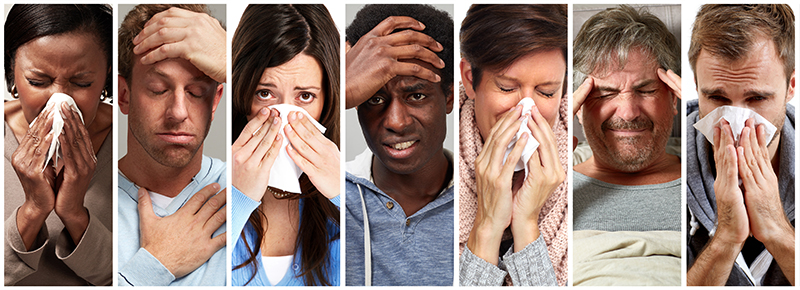Allergy and Immunology

Our Allergy and Immunology specialists have been named Seattle Top Docs!
Our Allergy and Immunologist:
John B.K.K. Yuen, MD, FACP, seeing patients since 2001
Allergens—the substances that cause the allergic reaction or disease—can be as complex as the diseases and conditions they cause. At Pacific Medical Centers, our allergy specialists provide the very best treatment available. Whether it’s hay fever (allergic rhinitis), asthma, a bee sting allergy or a skin rash (eczema), Pacific Medical Centers’ allergy specialists treat conditions in which the body’s immune system reacts abnormally to a substance.
Dr. Yuen additionally treats lupus and other autoimmune conditions. He can support those who live with autoimmune conditions to help them understand and manage allergens and reactivity to them.
We treat patients with a wide variety of allergic conditions and diseases, including:
- Severe hay fever
- Asthma
- Mold
- Dust and pollen allergies
- Food allergies
- Allergies to animal dander (pet allergies)
We also diagnose and treat patients who have:
- Contact dermatitis
- Latex allergies
- Connective tissue diseases such as lupus (systemic lupus erythematosus), scleroderma and rheumatoid arthritis
- Inflammation of a blood vessel (vasculitis)
- Hives
- Severe allergic reactions (anaphylaxis)
These are just some of the conditions our allergists diagnose and treat. Allergy specialists at Pacific Medical Centers may treat severe allergies with allergy shots (immunotherapy) or other methods.
Your Allergy Questions
Here are some of the common patient questions we hear, and the general answers we often share:
Do I have allergies or a cold?
A few good indicators are how fast symptoms arise and how long they last. Symptoms of a cold tend to develop gradually while symptoms of allergies have a more abrupt onset. Additionally, cold symptoms will usually go away after 3–7 days, whereas allergy symptoms will continue as long as you are exposed to your allergen.
Are my symptoms related to COVID-19, or are they just allergies?
COVID has many similar symptoms to allergies, but one key difference is fever, which over 90% of COVID-19 patients develop. Another key distinction is whether you have lower airway symptoms, such as dry cough and shortness of breath, or digestive symptoms. These may be indicative of COVID but are less associated with allergies. Much of this data is still evolving, so caution is needed. If you have questions, it’s best to consult with your medical provider.
Do I need to have a runny nose and sneeze to have allergies? What if I just feel sick, fatigue, or other symptoms on a seasonal cycle?
For some people, seasonal allergy reactions may include sore throat, fatigue and headaches—less traditionally associated with allergies. Seasonal allergies may be the culprit if these symptoms arise seasonally, at the same time others are complaining of allergies. If you have questions, we can test for seasonal allergens you may be sensitive to.
Why do I react to allergens sometimes but not others? Are there things I can do to react less to allergies?
Some people do not have extreme reactions to individual substances, but rather have mild sensitivities to a number of substances. When their overall combined exposure to these individual substances—a concept known as “allergic load”—reaches a certain threshold, they can have a reaction.
Comprehensive testing may be required to identify which substances you may be sensitive to, but a there are a few general tips that may help:
- Limit your early-morning outdoor time (5-10 a.m.) as this is when most plants and trees disperse their pollen.
- Avoid using fans that blow outdoor air into your home, as this can pull in pollen from outside.
- When driving, use your air conditioner to help to filter larger sized allergens.
- Use a dehumidifier to decrease mold growth in your home.
- Shower frequently to remove pollen from your skin and hair.
- Bathe your indoor pets regularly to remove pollen from their fur, and discourage them from sleeping in your bed or on other furniture.
- Use a face mask if you plan on doing extended gardening or mowing the yard.
- Avoid foods or exposure to other substances (i.e., cigarette smoke) you know you are sensitive to.
Are there any foods that help boost my immune system and stay healthy during allergy season?
Foods that can particularly boost your immune system include vegetables — especially broccoli, kale, and Brussels sprouts — along with mushrooms and fruits, with berries being standouts.
How does my autoimmune condition interact with allergens or allergy season?
Allergies and autoimmune conditions both stem from the immune system. There are many distinct autoimmune conditions with different causes and processes in the body, and individuals’ allergic reactivity is also unique. If you are living with an autoimmune condition and have questions about how allergies may interact, it’s best to come in for an individual consultation.
Read and listen as PacMed providers answer these and other allergy questions in the news:
Our allergy specialists, who are certified by the American Board of Allergy and Immunology, will do a thorough evaluation and talk with you about treatment clearly and kindly. While our allergists are highly trained experts, they also understand what it means to suffer from allergies and other immunological conditions.


